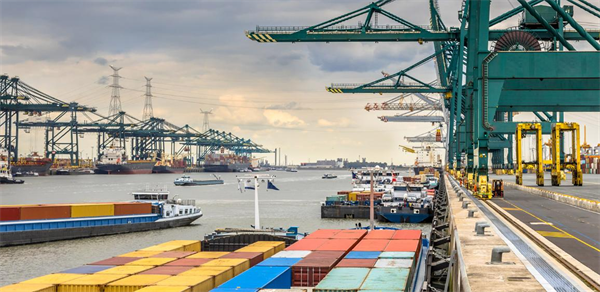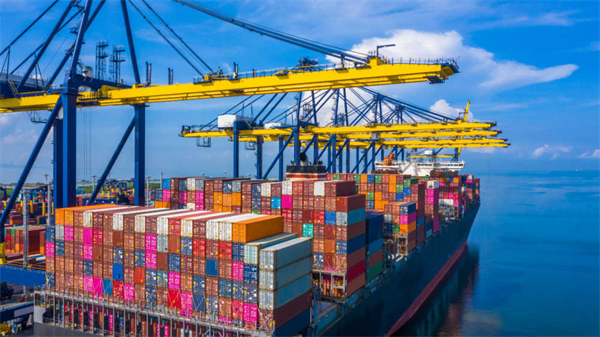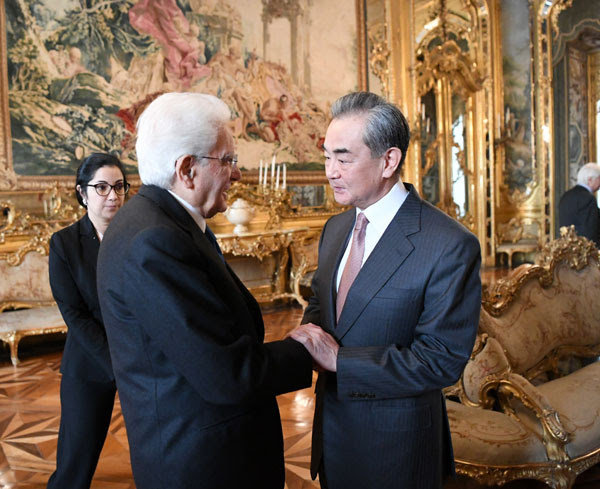The CCCEU Weekly Update 17 February 2023: U.S. overtakes China to become the EU's biggest trading partner in goods

U.S. overtakes China to become the EU's biggest trading partner in goods
Editor's Note: Transatlantic trade ties merged out of the pandemic ever closer and stronger: in 2022, the EU-US trade was so ballooned that a two-year rank was broken, with the U.S. resuming its position as the bloc's top trading partner in goods. This week's CCCEU Weekly Update keeps you up to date on China-EU dynamics. Enjoy reading and have a lovely weekend.

Eurostat's fresh data showed that the U.S. has surpassed China to become again the largest trading partner of the EU, suggesting ever enhanced transatlantic trade ties after the EU surpassing China to become the largest trading partner of the US in 2018.
China remains the EU's largest source of imports, and its advantages continue to grow.
In 2022, the EU's imports from China reached 626 billion euros, representing 1.72 times that of 2019 and 1.75 times that of the EU's imports from the US. In particular, the growth rate of the EU's imports from China in 2021 and 2022 reached new highs, leaping from the single-digit percentage maintained for many years to 23% and 32%, demonstrating China's supply chain's strong resilience even during the COVID-19 pandemic.
At the same time, the EU remains the single market with the most Chinese imports (ASEAN has not yet fully formed a single market, so its member countries are still counted separately).
Despite a modest decrease from the previous year in RMB-denominated imports from the EU, China's imports from the EU in 2022 nevertheless exceeded its imports from the US by 1.6 times. Euro-denominated exports from the EU to China and imports from China both keep rising. According to the aforementioned data, China and the EU's supply and demand are complementary, and the stimulation of their bilateral economic and trade cooperation has not altered.
In 2022, the US became the EU's largest trading partner due to the significant growth of its exports to the US.
Although the positive difference between the EU's imports from China and imports from the US continues to grow by 27.3 billion euros in 2022 compared to 2021, the negative difference between the EU's exports to China and exports to the US grows by 102.9 billion euros in 2022 compared to 2021. After subtracting imports and exports, the total trade value between the US and the EU in 2022 slightly exceeds that of China and the EU by 11.4 billion euros.
In fact, before the COVID-19 pandemic, the total trade value between the US and the EU was higher than that between China and the EU. China surpassed the United States to become the EU's largest trading partner only in 2020 and 2021.
The international division of labour is carried out differently by the EU, China, and the US depending on the technical circumstances, resource endowments, degree of development, and other factors. China primarily concentrates on the supply chain's upstream production. As a result, China depends on EU imports while the United States depends on EU exports in the competition to be the EU's top trading partner.
From the perspective of commodity structure, the expansion of EU exports to the US last year was mainly reflected in the export value of pharmaceutical products (SITC: 30), motor vehicles (SITC: 87), nuclear reactors, boilers and machinery products (SITC: 84), organic chemicals (SITC: 29) and others, which themselves are also main export products of the EU, and their technical complexity is high.
Meanwhile, the growth rate of the US's exports to the EU also reached 28.5%, ranking the highest in recent years. Among them, in addition to the export of fossil fuels (SITC: 27) from the US driven by the energy shortage in the EU, the export growth of the US to the EU is also more obvious in nuclear reactors, boilers and machinery products (SITC: 84), aircraft and spacecraft (SITC: 88), pharmaceutical products (SITC: 30) and other high-tech products.
This indicates that the present trend in the US and the EU's economic and trade sectors is towards increased coordination, cooperation, and complementarity in the sphere of favourable technologies. Both parties have a strong desire to strengthen the alliance in the technology sector and both hope to strictly adhere to the leading position of key technologies through "nearshore" or even "localization" of the upstream supply chain, taking into consideration their joint creation of the Technology and Trade Council and other initiatives. Thus, it is likely that the expansion of "North-North trade" between the US and the EU will continue.
Geopolitical concerns also cannot be disregarded. The crisis between Russia and Ukraine led the EU to gradually reduce its reliance on Russia for energy before importing it from the US. Fossil fuel exports from the US to the EU grew by 136% in 2022 compared to 2021, creating a massive trade surplus.
The euro also stayed weak during the same period. Many times, the euro-to-dollar exchange rate was less than 1:1. It has been 11 years since the European Central Bank last increased interest rates. Short-term imports from the EU to the US were driven by the depreciation of the euro and the surplus produced by energy trade. The situation in Russia and Ukraine is still unclear, but there are still variables that favourably impact trade between the United States and Europe.
Although China has long been the largest source country of imports and the second largest trading partner of the EU, there is still huge potential for development of bilateral economic and trade cooperation.
Although China has long been the EU's second-biggest trading partner and the largest source of imports, there is still a great deal of room for expanding bilateral economic and trade cooperation.
Chinese businesses also value the prospects provided by the EU. Entrepreneurs from Zhejiang, Jiangsu, Guangdong, Shandong, and other regions of China have been visiting Germany, the Czech Republic, Italy, Poland, and other EU countries since December of last year to conduct business. China is currently actively pursuing institutional openness, developing domestic laws and institutional frameworks connected to high-standard international economic and trade laws, and anticipating the entry of EU businesses. We anticipate that trade between China and the EU will continue to grow in scope, value, and advantages this year.
Europe's spending on energy crisis nears €800 billion
According to Euractiv, European countries' bill to shield households and companies from soaring energy costs has climbed to nearly €800 billion, researchers said on Monday (13 February), urging countries to be more targeted in their spending to tackle the energy crisis.
Finnish president wants Finland, Sweden in NATO by summer
The Finnish president said in an interview published Saturday that he trusts that Finland and Sweden will be admitted into NATO by July.
NATO requires unanimous approval from its existing members to admit new ones. Turkey and Hungary are the only nations in the 30-member military alliance that haven't formally endorsed Sweden and Finland's accession.
While Hungary has pledged to do so in February, Turkey hasn't indicated willingness to ratify the two countries' accession any time soon. Niinistö stressed that the final Turkish decision is up to Turkish President Recep Tayyip Erdogan.
Ford to cut 3,800 jobs in Europe over next three years
According to euronews, the Ford Motor Company plans to slash 3,800 jobs in Europe over the next three years in a bid to establish "a leaner more competitive cost structure for Ford in Europe."
The automaker will embark on consultations "with the intent to achieve the reductions through voluntary separation programs" Ford said.
2,300 jobs will be cut in Germany, 1,300 in the UK and 200 elsewhere on the continent.
EU proposes 10th sanction package on Russia
According to CGTN, the European Union's executive arm on Wednesday proposed new sanctions on Russia that would cut off goods worth 11 billion euros ($11.77 billion) and target Iran's drone producers.
Any new measures, which the bloc is expected to agree to mark the first anniversary of the conflict on February 24, would require the unanimous backing of all EU member states.
Countries warn EU against 'crisis mode' overhaul of energy market
Denmark, Germany, the Netherlands, Estonia, Finland, Luxembourg and Latvia have warned Brussels not to rush into major changes to the European Union's electricity market in response to the energy crisis, calling instead for limited tweaks to the system.
The European Commission is drafting a revamp of EU electricity market rules, with the aim of better cushioning consumer bills from fossil fuel price spikes and avoiding a repeat of the surge in electricity prices triggered last year by cuts to Russian gas supply.
The seven countries, led by Denmark, said in a letter that Europe's existing market design has fostered years of lower electricity prices, helped expand renewable energy, and ensured enough power was produced to meet demand and avoid shortages.
Senior Chinese diplomat to visit France, Italy, Hungary, Russia, attend 59th Munich Security Conference in Germany

According to Xinhua, Wang Yi, director of the Office of the Foreign Affairs Commission of the Communist Party of China (CPC) Central Committee, will visit France, Italy, Hungary and Russia from Feb. 14 to 22 at the invitation of the governments of the four countries, Foreign Ministry Spokesperson Wang Wenbin announced on Monday.
Wang Yi, director of the Office of the Foreign Affairs Commission of the Communist Party of China (CPC) Central Committee, meets with Italian Deputy Prime Minister and Minister of Foreign Affairs Antonio Tajani in Rome, Italy on Feb 16, 2023. China is ready to deepen comprehensive strategic cooperation with Italy to bring bilateral relations to a higher level, Wang Yi said here Thursday.
French President Emmanuel Macron met here on Wednesday with Wang Yi, director of the Office of the Foreign Affairs Commission of the Communist Party of China (CPC) Central Committee. Noting that China always regards France as a priority partner of cooperation, Wang has said that China is willing to further tighten high-level exchanges with France, to open up new prospects for Sino-French relations, to inject new impetus into the development of China-EU relations, and to make new contributions in promoting international cooperation and tackling global challenges. On Wednesday, Wang also met with French Minister for Europe and Foreign Affairs Catherine Colonna.
Wang Yi meets with Laurent Fabius, president of the French Constitutional Council and former French prime minister, in Paris, France, on Feb. 16, 2023. At the same day, Wang Yi and diplomatic counselor to French President Emmanuel Macron co-chaird the 23rd China-France Strategic Dialogue in Paris.
EU countries agree to scrap COVID tests for travelers from China
According to Politico, EU countries have agreed to phase out two of the recommended travel-related measures agreed upon in the wake of China's scrapping of its zero-COVID policy, the Swedish Presidency said in a statement on Thursday.
Countries agreed to lift the requirement for a negative pre-departure COVID-19 test for people traveling to the EU from China by the end of February and put an end to randomly testing travelers arriving from China by mid-March.
What are experts talking about?
"The EU should cherish the goodwill released by the Chinese side" by Wu Huiping, Professor and Deputy Director of the German Studies Centre of Tongji University. The article points out that the statement made by Ambassador Fu Cong, head of the Chinese mission to the EU, when attending a "60 minutes briefing" organised by the European Policy Centre, is a clear signal of China's goodwill and deserves to be cherished and seriously considered by the EU. The author believes that there are indeed different views between China and Europe on some specific issues, but there are no fundamental strategic differences or conflicts between them, and cooperation has always been the main theme of China-EU relations, and both sides need to move towards each other on the basis of mutual respect, mutual benefit and win-win situation.
"Climate versus trade? Reconciling international subsidy rules with industrial decarbonization." Published by Bruegel. The author is David Kleiman. The article points out that the vast environmental subsidies that may be required for the transition to net-zero greenhouse gas emissions are starting to generate international trade and political frictions between the world's largest economies. This puts (supra-)national industrial decarbonisation efforts on a collision course with international subsidies rules and national countervailing duty (ie anti-foreign subsidy) laws and regulations. The authors argue that environmental subsidies could be justified when emissions taxation is not feasible or is insufficient due to political economy constraints.
Please note: the English version of this issue is slightly different from our Chinese one. The views and opinions expressed in this article do not necessarily reflect the official position of the CCCEU.

 Login
Login Login
Login CCCEU and Gunnercooke Successfully Host Webinar on CSDDD and FLR Compliance to Guide Chinese Businesses
CCCEU and Gunnercooke Successfully Host Webinar on CSDDD and FLR Compliance to Guide Chinese Businesses Cultivating responsible China-EU business leaders essential to tackling global challenges
Cultivating responsible China-EU business leaders essential to tackling global challenges



